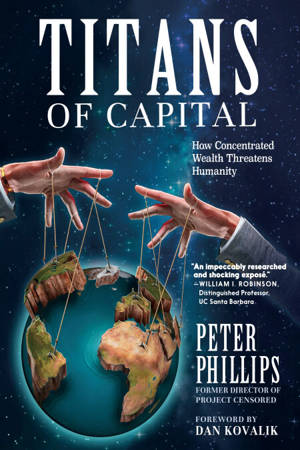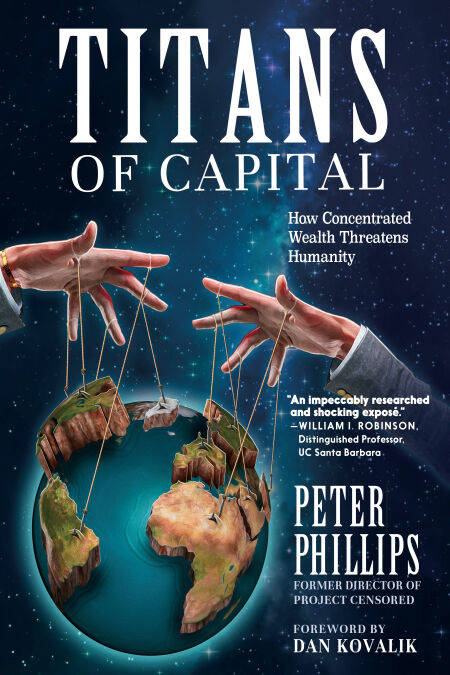
- Retrait gratuit dans votre magasin Club
- 7.000.000 titres dans notre catalogue
- Payer en toute sécurité
- Toujours un magasin près de chez vous
- Retrait gratuit dans votre magasin Club
- 7.000.0000 titres dans notre catalogue
- Payer en toute sécurité
- Toujours un magasin près de chez vous
12,80 €
+ 12 points
Format
Description
A fascinating examination of the rapid concentration of global capital, with chapters that focus on China and Russia.
Explores how fewer and larger investment companies now manage the excess financial wealth of the world’s 40 million richest people, to the detriment of everyone else and the global environment.
In Titans of Capital, Peter Phillips, a political sociologist, poses three key research questions: To what extent do the wealthy influence—or even dominate—decision making that affects all of us in society? Who are the most powerful people? And how does the accumulation of capital work?
Networks of wealthy individuals have evolved since the COVID-19 pandemic, and Titans of Capital shows how the financial investments of transnational elites threaten human rights and the future of the planet.
Private capital investments serve as the primary operating funds for international arms sales, private prisons, and other socially negative activities. These investments fuel the continued use of carbon-based energy leading to amplified global warming and climate change. Military spending is a critical component of continued wealth concentration and political power in the world. Spending on arms and intelligence is a required aspect of maintaining global power and control. Dealing with Russia, China, Iran and other “rogue” states is a continuing agenda for agents of the world power elites. Propaganda machines in Western capitalist governments serve to protect elite wealth by promoting military conflicts to open new regions for economic investment.
Phillips warns that while continued concentration of global capital increases the profits enjoyed by the global economy’s “Titans,”, it also increases global inequality, starvation, and civil unrest, threatening the lives of the hundreds of millions of people living in extreme poverty. It is imperative to ask how we can reverse the concentration of Titan wealth and revitalize grassroots democracy unbridled by extreme wealth. Identifying 117 global Titans by name and exposing the networks and interests that unite them provides readers opposed to militarism and committed to economic equality with crucial tools to directly engage the power elite who endanger life on earth.
Explores how fewer and larger investment companies now manage the excess financial wealth of the world’s 40 million richest people, to the detriment of everyone else and the global environment.
In Titans of Capital, Peter Phillips, a political sociologist, poses three key research questions: To what extent do the wealthy influence—or even dominate—decision making that affects all of us in society? Who are the most powerful people? And how does the accumulation of capital work?
Networks of wealthy individuals have evolved since the COVID-19 pandemic, and Titans of Capital shows how the financial investments of transnational elites threaten human rights and the future of the planet.
Private capital investments serve as the primary operating funds for international arms sales, private prisons, and other socially negative activities. These investments fuel the continued use of carbon-based energy leading to amplified global warming and climate change. Military spending is a critical component of continued wealth concentration and political power in the world. Spending on arms and intelligence is a required aspect of maintaining global power and control. Dealing with Russia, China, Iran and other “rogue” states is a continuing agenda for agents of the world power elites. Propaganda machines in Western capitalist governments serve to protect elite wealth by promoting military conflicts to open new regions for economic investment.
Phillips warns that while continued concentration of global capital increases the profits enjoyed by the global economy’s “Titans,”, it also increases global inequality, starvation, and civil unrest, threatening the lives of the hundreds of millions of people living in extreme poverty. It is imperative to ask how we can reverse the concentration of Titan wealth and revitalize grassroots democracy unbridled by extreme wealth. Identifying 117 global Titans by name and exposing the networks and interests that unite them provides readers opposed to militarism and committed to economic equality with crucial tools to directly engage the power elite who endanger life on earth.
Spécifications
Parties prenantes
- Auteur(s) :
- Editeur:
Contenu
- Nombre de pages :
- 224
- Langue:
- Anglais
Caractéristiques
- EAN:
- 9781644214343
- Date de parution :
- 16-09-24
- Format:
- Ebook
- Protection digitale:
- Adobe DRM
- Format numérique:
- ePub

Les avis
Nous publions uniquement les avis qui respectent les conditions requises. Consultez nos conditions pour les avis.






